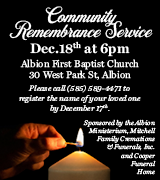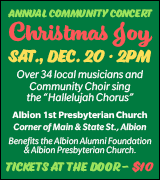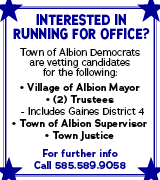Quick Questions with Chris Wylie
Cerebral palsy doesn’t keep pastor from pulpit in Knowlesville and Millville

Photos by Tom Rivers – Chris Wylie shares the children’s message during Sunday’s service at The United Methodist Church of the Abundant Harvest in Millville. Wylie preaches there at 11 a.m., following a 9:30 a.m. service in Knowlesville.
Chris Wylie was born struggling to breathe. He had cerebral palsy and doctors said he would never walk. He was put up for adoption.
Wylie, now 46, was welcomed into a loving home as a young boy, and he would learn to walk chasing after his sister. He played lots of sports as a kid and went on to a career as a banker for 10 years in downtown Buffalo with HSBC.
He felt a call to the ministry about a decade ago and attended the former United Theological Seminary in West Seneca, a pastoral training program run through Houghton College. He would lead United Methodist churches in Hartland, Alden, and Pavilion before being appointed as pastor for the Millville and Knowlesville United Methodist churches almost two years ago. For more than two decades, the churches shared a pastor while maintaining their own congregations and buildings.
Under Wylie’s leadership, the churches have merged into The United Methodist Church of the Abundant Harvest. That merger became effective on Jan. 1, following approvals from each congregation, and the Upper New York Conference of the United Methodist Church.
“It ties the two churches,” Wylie said. “They have two distinct talents. By tying them together you can compound those talents for one great tool for God.”
Wylie leads a 9:30 service on Sunday mornings in Knowlesville at this church, which put on a new roof last year and also started a pie shop across Knowlesville Road at its fellowship hall.
Wylie built support for the merger by listening to members in both churches, and guiding the process, said long-time member Peter Beach of the Millville church.
“He tries to make changes without rubbing people the wrong way,” Beach said.
Wylie preaches while sitting down and uses a cane or a wheelchair to move around church.
“He’s overcome a lot in his life,” Beach said. “Things we take for granted are a struggle for him. What he does is inspiring.”
The Knowlesville church has about 40 regular attendees and last year completed a $15,000 project to put a new roof on the building at 3622 Knowlesville Rd. The congregation also started as coffee and pie shop at its fellowship hall from 9 a.m. to 4 p.m. on Fridays and Saturdays. “That has taken off more than we expected,” Wylie said.
About 60 people attend the Millville location. Both sites have upgraded their projector screens, multi-media equipment and sound systems. Wylie enjoys using videos and pictures in his sermons.
(His wife Jennelle, director of academic support and training at Roberts Wesleyan College, helps with the church’s technology and multimedia issues. The Wylies have an 8-year-old daughter, Hope.)
Each church, or campus as Wylie calls the two sites, has its own service. Wylie leads church in Knowlesville at 9:30 a.m. and then goes to the Millville location at 11 a.m.
That hasn’t changed from before the merger. But Wylie said the congregations are doing more sharing, and will have a unified web site, social media presence and other collaborations.

The service in Millville on Maple Ridge Road starts at 11 a.m. on Sundays with a lunch to follow.
Wylie chatted for an interview on Sunday at the Millville site. The church was busy with its weekly luncheon after the service. Wylie is happy to see several families with young children stay for the lunch.
On Sunday, Wylie preached about “restoration,” a message that included photos of a beat-up El Camino that was repaired. He said there is symbolism in that vehicle and God’s restorative work in people.
Q: Is part of your ministry showing people that you shouldn’t hold yourself back and not let fears or limitations prevent you from trying?
A: I would say, and in fact I often say, ‘Don’t let what you can’t do stop you from doing what you can.’ I try to live that way. That doesn’t mean that it’s easy and that doesn’t mean there won’t be times of discouragement, but that’s where the support comes in. That’s what we have, the community.
Q: It seems like these churches are not very accessible for people in wheelchairs or who may have challenges getting around?
A: This one (Millville) is, while Knowlesville isn’t so much. We’ve looked at making modifications for handicapped accessibility. I can get up the stairs, but certainly there are times of the year when that is a problem.
In Knowlesville there are people who come to a point in their life where they can’t come to church because they physically can’t get in. So we try to address these things as we go. Sometimes it’s as simple as railings, or other things that were never there that were put to help Chris, and then you see other people also using them.

Chris Wylie is pictured with his wife Jennelle inside the fellowship hall in Millville.
Q: I wonder too if people see you getting a little help then they realize that that is OK for all of us as human beings, that we don’t have to do everything on our own?
A: Yes, they see it’s great to lean on each other.
Q: I think some people might have too much pride and may not want help, especially in a public way.
A: I think there is absolutely that. I talk about this a lot. As people, especially as people get older (and I’m living some of that now), you want to do the things you always used to be able to do, and sometimes that’s not possible, sometimes that involves doing things a little bit differently, and other times that involves asking for help.
That was part of my message today at church that it’s not about Chris trying to everything, because Chris, even in an able body, can’t do everything. It’s about what we can all do together.
Q: What do you like about being a pastor?
A: The people.
I’ve had a lot of people reach out to me in my life and help me. I’ve had people help me who didn’t have to do what they did. They went beyond themselves to be connected to others.
Q: Do you think your condition has made you a more compassionate person and helped you connect with people?
A: I can see it. It gives me better understanding. I have not been through every situation, but I definitely have some understanding that maybe others might not have because they haven’t been there yet.
Q: (People are talking in background at fellowship hall.) I’m struck by the number of children and younger families that attend church here. You have a good intergenerational mix.
A: I connect with the older people because of the body in which I live. But I’m also, even at my age, fairly young for a pastor, and having the young daughter, and knowing that I like a different style of music and knowing that I sometimes experience things in a different way so we’re bringing in the multimedia, we’re connecting with younger people on a different level and being intentional about that.
We’re not only saying we want you to come, but we’re giving them a voice as part of the community. That’s so important because no matter what you’re doing, if you don’t have a voice you’re not going to be connected.
Knowlesville has teen-agers and here at Millville with have a lot of younger kids.

Chris Wylie leads the congregation at Millville in prayer during the service this past Sunday.
Q: So many of the rural churches seem to be struggling. What do you think has been working here?
A: It’s as simple as being part of people’s lives, just sitting down and talking with them. We did that when we first started. I don’t come and tell them what I wanted. I asked them, ‘What do you want to see here?’ So not having it be Chris-centered, but instead what do we want, what is our hope here, what to we want to be? So it’s listening and moving into that.
Q: Is the fellowship hall and food a big part of that, of doing life together?
A: That’s exactly what it is. If you look at the Book of Acts, Chapter 2, it says that they ate together, they worshipped together, they did life together. That’s what we’re trying to do. It’s connection.
That’s something the church here was doing before I got here. We also have had people in to the parsonage for dinners in smaller groups, from anywhere between 1 to 5.
Q: Do the churches work together on the popular Lenten fish fries?
A: We’re working on that. We’re still at the early stages of making us-and-them just us. That’s the hope here.

Sunlight pours through a stained-glass window at the church at Millville.
Q: You do basically the same service at both places?
A: I do, yes. The bulletin, in general, we keep the same. There is a choir here (Millville) but there is no choir at Knowlesville. But mostly it’s similar.
Q: You could see how having the choir in Knowlesville, if someone wanted to sing from Millville, they could be part of the choir. And maybe the choir would sing at Millville on some Sundays.
A: That’s exactly what we’re trying to do.
Q: It looks like you have to work harder than everyone to get around, especially in the winter.
A: Some days. We all have those challenges. Mine are just more visible. We all have challenges in one way or another. Some people have things you don’t readily see, and to me that’s harder because you look healthy. With me, everything that Chris is going through is on the surface.
I know my body is breaking down faster than I’d like, but I don’t know what it’s like to be an able body, so to speak, so I’ve always had to adapt. I’ve had to do things outside the box a little bit, but you still get them done.
Q: You mentioned you could have been on disability and not worked?
A: Nobody can deny I am disabled, just look at me. I could have done that, but as long as I can find a way to keep moving forward, I’m going to keep moving forward.
There will be a day for all of us, sooner or later, when we can’t do, but while I can do, I’m still going to do.































































